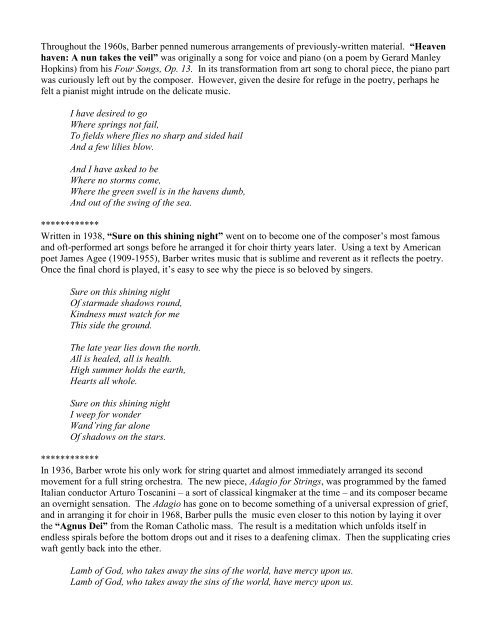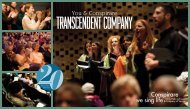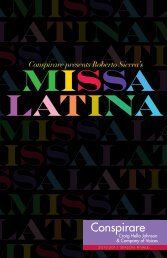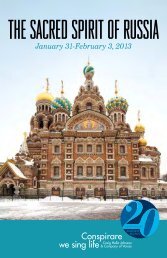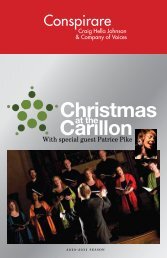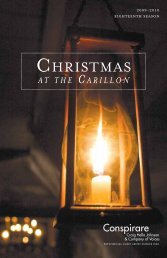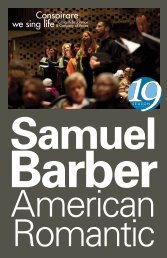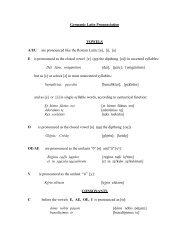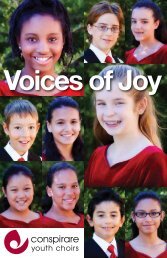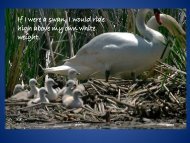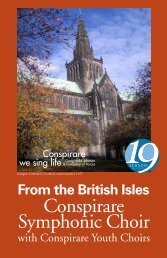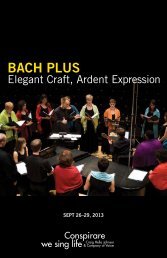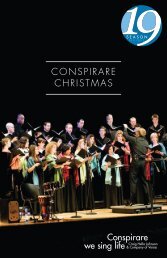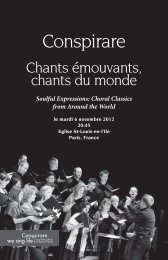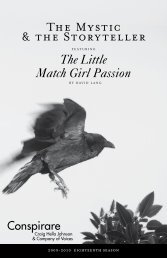PROGRAM NOTES & TEXTS Choral Music of Samuel ... - Conspirare
PROGRAM NOTES & TEXTS Choral Music of Samuel ... - Conspirare
PROGRAM NOTES & TEXTS Choral Music of Samuel ... - Conspirare
You also want an ePaper? Increase the reach of your titles
YUMPU automatically turns print PDFs into web optimized ePapers that Google loves.
Throughout the 1960s, Barber penned numerous arrangements <strong>of</strong> previously-written material. “Heaven<br />
haven: A nun takes the veil” was originally a song for voice and piano (on a poem by Gerard Manley<br />
Hopkins) from his Four Songs, Op. 13. In its transformation from art song to choral piece, the piano part<br />
was curiously left out by the composer. However, given the desire for refuge in the poetry, perhaps he<br />
felt a pianist might intrude on the delicate music.<br />
I have desired to go<br />
Where springs not fail,<br />
To fields where flies no sharp and sided hail<br />
And a few lilies blow.<br />
And I have asked to be<br />
Where no storms come,<br />
Where the green swell is in the havens dumb,<br />
And out <strong>of</strong> the swing <strong>of</strong> the sea.<br />
************<br />
Written in 1938, “Sure on this shining night” went on to become one <strong>of</strong> the composer‟s most famous<br />
and <strong>of</strong>t-performed art songs before he arranged it for choir thirty years later. Using a text by American<br />
poet James Agee (1909-1955), Barber writes music that is sublime and reverent as it reflects the poetry.<br />
Once the final chord is played, it‟s easy to see why the piece is so beloved by singers.<br />
Sure on this shining night<br />
Of starmade shadows round,<br />
Kindness must watch for me<br />
This side the ground.<br />
The late year lies down the north.<br />
All is healed, all is health.<br />
High summer holds the earth,<br />
Hearts all whole.<br />
Sure on this shining night<br />
I weep for wonder<br />
Wand’ring far alone<br />
Of shadows on the stars.<br />
************<br />
In 1936, Barber wrote his only work for string quartet and almost immediately arranged its second<br />
movement for a full string orchestra. The new piece, Adagio for Strings, was programmed by the famed<br />
Italian conductor Arturo Toscanini – a sort <strong>of</strong> classical kingmaker at the time – and its composer became<br />
an overnight sensation. The Adagio has gone on to become something <strong>of</strong> a universal expression <strong>of</strong> grief,<br />
and in arranging it for choir in 1968, Barber pulls the music even closer to this notion by laying it over<br />
the “Agnus Dei” from the Roman Catholic mass. The result is a meditation which unfolds itself in<br />
endless spirals before the bottom drops out and it rises to a deafening climax. Then the supplicating cries<br />
waft gently back into the ether.<br />
Lamb <strong>of</strong> God, who takes away the sins <strong>of</strong> the world, have mercy upon us.<br />
Lamb <strong>of</strong> God, who takes away the sins <strong>of</strong> the world, have mercy upon us.


